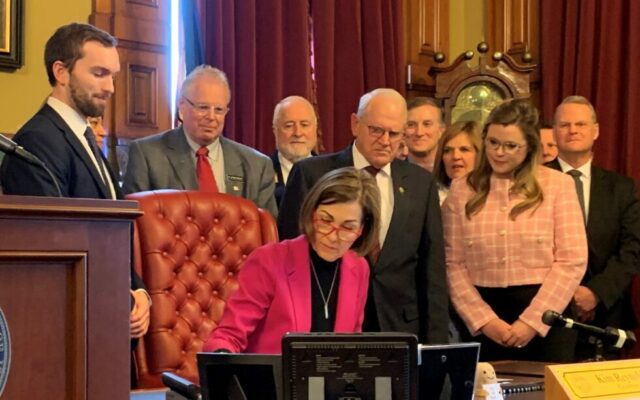Governor rejects GOP plan to restrict attorney general’s authority

DES MOINES — Republican Governor Kim Reynolds has rejected a plan to restrict the authority of Iowa’s attorney general.
Reynolds says she shares concerns raised by Republican lawmakers about having Attorney General Tom Miller join lawsuits challenging Trump Administration policies, as those lawsuits conflict with the policy goals of the Republican-led legislature and her. However, Reynolds said she’s cautious about redefining the attorney general’s duties since he’s elected to the job by voters.
Reynolds and Miller recently met privately to discuss this proposal. The governor announced today that Miller has agreed to consult with her and join lawsuits on behalf of the state only when she agrees. If the governor doesn’t agree with a lawsuit’s aims, Miller may still join it — but independently under his own name, not on behalf of the State of Iowa.
Here is the letter Reynolds sent the legislature, explaining her decision:
“I share many of the concerns expressed by members of the Legislature about the past actions of Attorney General Tom Miller in courts outside of Iowa. He has participated in litigation throughout the nation, repeatedly taking positions in the name of the State of Iowa that are in conflict with Iowa’s statutes, the policy goals of the Legislature and Governor, and the best interests of Iowans. But I am cautious about approving a provision that redefines the scope of the Attorney General’s duties because I am mindful that the Attorney General is also elected by, and directly accountable to, the people of Iowa.
“As a result of the Legislature’s leadership on this issue, Attorney General Miller and I have had the opportunity to engage in a thoughtful discussion about the appropriate balance of authority between the Governor and the Attorney General with respect to Iowa’s involvement in litigation. And ultimately, Attorney General Miller agreed to my proposal to adjust our litigation practices in a manner that I believe addresses my core concerns without amending Iowa’s current statutes.
“Attorney General Miller has agreed that so long as he serves as Attorney General, he will not prosecute any action or proceeding or sign onto or author an amicus brief in the name of the State of Iowa in any court or tribunal other than an Iowa state court without the consent of the Governor. He retains the authority to participate in litigation or author letters in his own name, as Attorney General of Iowa. Attorney General Miller has also agreed that if the Governor requests that he prosecute an action or proceeding or file an amicus brief in any court, he will do so or facilitate outside counsel, and that such participation requested by the Governor shall be conducted in the name of the State of Iowa.
“This agreement is an appropriate interpretation of the authority and duties provided for under existing Iowa law and our constitutional structure. It ensures that the State of Iowa will speak with one consistent voice when it participates in court proceedings outside of our state. And it respects the Attorney General’s independent authority and accountability to the people of Iowa.
“I commend the Legislature for starting this important discussion and Attorney General Miller for his willingness to reevaluate our practices with respect to engaging in litigation on behalf of the State of Iowa. I look forward to working with Attorney General Miller to ensure that the State’s litigation advances the interests of Iowans.”
Attorneys general from other states, including Republicans from Idaho and Nebraska, sent letters to Reynolds urging her to reject the plan that would have required Miller to get approval from the governor, the state executive council or the legislature before signing on to any lawsuit filed in a court outside of Iowa.
The proposal was included in a budget bill and Reynolds used her item veto authority to remove it before signing the measure into law.
Attorney General Miller released this statement on the governor’s decision:
Today I have entered into a compromise agreement with Gov. Kim Reynolds concerning lawsuits filed by my office. I do so for the following reasons.
The legislation would limit the ability of my office and my successors to bring litigation outside the state courts of Iowa. My greater concern was always about the institution of the Attorney General and its powers and duties. My successors were always more important than the current Attorney General. By vetoing the legislation, Governor Reynolds is protecting this interest and concern. A long time ago when I was first elected Attorney General of Iowa, my elders — the other state Attorneys General — preached to me the importance of the powers and duties of our office and the great obligation to protect those powers and duties. I will not be haunted by the ghosts of my elders.
While I am Attorney General, I agree to get the consent of the Governor to bring out of state cases when the State of Iowa is the plaintiff, but not when the Attorney General of Iowa is the plaintiff. This means that generally I will not be suing the Trump administration. I brought a selective number of lawsuits against the Trump administration in the last two-plus years. I believe they were well grounded in the law. According to the available polling data, these cases, such as the ones concerning the Dreamers and separating children from parents, were supported by a majority of Iowans. The cases were also supported by Iowans in their overwhelming re-election of me just last November. I am reassured by the fact that the cases will continue to be brought by my 26 Democratic Attorney General colleagues, and they will do a very effective job.
This agreement allows my office to continue to protect Iowans through consumer enforcement actions, which are primarily filed in Iowa courts. It also allows me to express my opinion on matters affecting Iowans before federal agencies and Congress.
This is a good-faith agreement between Governor Reynolds and me. In my opinion, there are too few good-faith compromises today in Washington and Des Moines. This also leads me to make this agreement.



